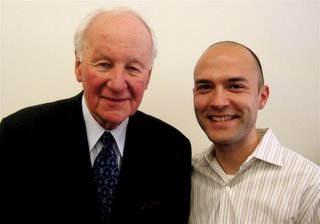
The following is something I put together for myself after reading John Stott's book
Between Two Worlds on preaching. This is basically an outline of his chapter on preparing a message with slight additions for my own personal use. I hope it encourages fellow pastors. (The picture is from this spring when I had the privilege of meeting Mr. Stott when he visited the states.)
Preparing a Sermon
1. Choose your text and meditate on it.• Read the text, re-read it, re-read it and read it again. • Probe it, chew on it, bore into it, soak in it. • You are not called to preach yourself or your ideas, but charged to "preach the word" (2 Tim. 4:1-2). Clarence Edward McCartney: "Put all the Bible you can into it."
2. Ask questions of the text.
• What does it mean? Or better yet, what did it mean when first spoken or written?
• What did the author intend to affirm or condemn or promise or command?
• What does it say? What is its contemporary message? How does it speak to us today?
• Remember: Keep these questions distinct but together--the text's meaning is of purely academic interest unless you go on to discern its message for today, it's significance. But you cannot discover it's contemporary message without first wrestling with its original meaning.
3.Combine diligent study with fervent prayer.
• All the time you study cry humbly to God for illumination by the Spirit of truth. Like Moses, "I pray you, show me your glory" (Exod 33:18), and Samuel, "Speak, Lord, for your servant is listening" (1 Sam 3:9).
• Stott: "I have always found it helpful to do as much of my sermon preparation as possible on my knees, with the Bible open before me, in prayerful study.
• R.W. Dale: "Work without prayer is atheism; and prayer without work is presumption."
4. Isolate the Dominant Thought of the Text.
• Every text has a main theme, an overriding thrust.
• A sermon is not a lecture, it aims to convey only one major message
• The congregation will forget details of the message, but they should remember the dominant thought, because all the sermon's details should be marshaled to help them grasp its message and feel its power.
• Once the text's principle meaning has been determined, express it in a 'categorical proposition.'
• J.H. Jowett: "I have a conviction that no sermon is ready for preaching...until we can express its theme in a short, pregnant sentence as clear as a crystal. I find the getting of that sentence is the hardest, the most exacting and the most fruitful labor in my study...I do not think any sermon ought to be preached, or even written, until that sentence has emerged, clear and lucid as a cloudless moon."
• Ian Pitt-Watson: "Every sermon should be ruthlessly unitary in its theme."
• Don't by-pass the discipline of waiting patiently for the dominant thought to disclose itself. You have to be ready to pray and think yourself deep into the text, even under it, until we give up all pretensions of being its master or manipulator, and become instead its humble and obedient servant.
5. Arrange Your Material to Serve the Dominant Thought
• The goal is not a literary masterpiece, but organization that enables the text's main thrust to make its maximum impact.
- Ruthlessly discard irrelevant material
- Subordinate material to theme so that it illumines and supports it.
• Golden Rule for Sermon Outlines: Let each text supply its own structure. Let it open itself up like a rose to the morning sun.
• Be precise with your words. It is impossible to convey a precise message without choosing precise words.
• Words to use:
- Simple and Clear words. Ryle: "Preach as if you had asthma."
- Vivid words. They should conjur up images in the mind.
- Honest words. Beware of exaggerations and be sparing in use of superlatives.
- C.S. Lewis: don't just tell people how to feel, describe in such a way that people feel it themselves.
- Don't use words too big for the subject.
6. Remember the Power of Imagination--Illustrate!
• Imagination: the power of the mind by which it conceives of invisible things, and is able to present them as though they were visible to others. (Beecher)
• Remember that humans have trouble grasping abstract concepts--we need them converted into pictures and examples.
• Exert your greatest effort for illustrations that reinforce and serve the dominant thought.
• Think of illustrations as windows that let in light on our subject and help people to more clearly see and appreciate it.
• Beware of illustrations that draw too much attention (to themselves instead of the subject) or which actually take people away from the main point.
7. Add Your Introduction
• It's better to start with the body so that we don't twist our text to fit our introduction.
• Stott: A good introduction serves two purposes. First, it arouses interest, stimulates curiosity, and whets the appetite for more. Secondly, it genuinely introduces the theme by leading the hearers into it.
• Don't make the intro too long or too short. "Men have a natural aversion to abruptness, and delight in a somewhat gradual approach. A building is rarely pleasing in appearance without a porch or some sort of inviting entrance."
8. Add Your Conclusion
• Conclusions are more difficult. Avoid endlessly circling and never landing. Avoid ending too abruptly.
• A true conclusion goes beyond recapitulation to personal application. (Not that all application should wait till the end--the text needs to be applied as we go along.)
• Nevertheless, it is a mistake to disclose too soon the conclusion to which we are going to come. If we do, we lose people's sense of expectation. It is better to keep something up our sleeve. Then we can leave to the end that persuading which, by the Holy Spirit's power, will prevail on people to take action.
• Call the congregation to act! Our expectation as the sermon comes to an end, is not merely that people will understand or remember or enjoy our teaching, but that they will do something about it. If there is no summons, there is no sermon!
• The precise application of your sermon depends on the character of the text. The dominant thought points us to how people should act in response. Does the text call to repentance or stimulate faith? Does it evoke worship, demand obedience, summon to witness, or challenge to service? The text itself determines the particular response we desire.
• Consider the composition of your congregation. It is good to let your mind wander over the church family and ask prayerfully what message God might have for each from your text. Consider their unique circumstances, weaknesses, strengths and temptations.
9. Write Down Your Sermon
• Don't take too long to get to this stage! Get something on paper, don't endlessly noodle on vague notes (this is my temptation).
• Writing obliges you to think straight.
10. Edit it Again
• View hitting your time goal (40-45 minutes) as just as essential to its overall effectiveness as anything else you do. People will take more away if you say less.
• Ruthlessly cut the unneeded and extra. Look for places where you can be more concise.
• Err on the side of cutting things--especially long quotes.
11. Pray over Your Message
• Use the 30 minutes before you leave for church to pray over your message.
• Stott: "We need to pray until our text comes freshly alive to us, the glory shines forth from it, the fire burns in our heart, and we begin to experience the explosive power of God's Word within us."
 I want to end the week with a great sermon on the purpose of our lives, to be sent as messengers into the world. It is a perfect conclusion to a week of Dr. Keller and a great way to apply what is learned through this man. I trust you have been encouraged this week.
I want to end the week with a great sermon on the purpose of our lives, to be sent as messengers into the world. It is a perfect conclusion to a week of Dr. Keller and a great way to apply what is learned through this man. I trust you have been encouraged this week.











